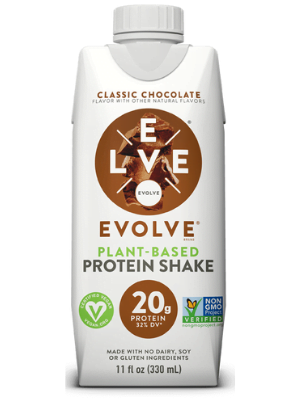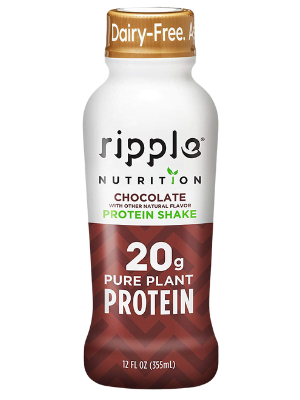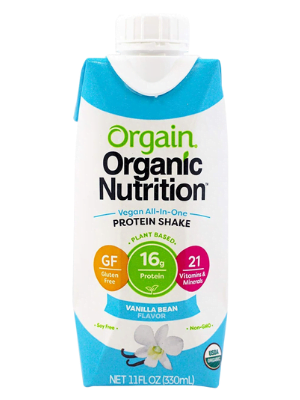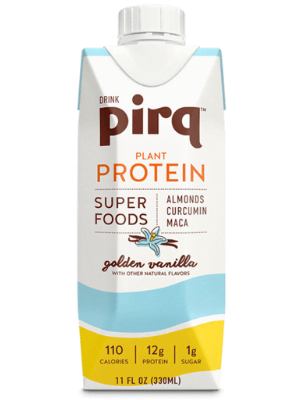A lot of people on plant-based diets can be deceived when reading phrases like “lactose-free” or “non-dairy” on product labels. When it comes to protein shakes, you might be wondering, is muscle milk really vegan?
Muscle Milk powders and ready-made drinks are not vegan since they contain proteins derived from cow’s milk. Muscle Milk is technically non-dairy. If you want a vegan protein drink, consider trying Ripple, Evolve, or another plant-based alternative.
In this article, we’ll be diving into the exact makeup of Muscle Milk drinks and why they aren’t considered vegan.
Keep reading to learn about plant-based alternatives that still achieve the same effect for athletes and people who just want more protein in their diets.
The Consensus - Is Muscle Milk Vegan?
Regardless of the tempting labels of “lactose-free” on many Muscle Milk drinks and mixes, these products are not truly vegan-friendly.
Muscle milk is typically considered non-dairy, even though it makes use of proteins that come from dairy.
However, traditional Muscle milk is not technically vegan because it contains animal byproducts in the form of whey (a primary cow dairy protein).
If you check the ingredient lists on the labels of Muscle Milk products, you’ll find that they state clearly that they contain ingredients that are derived from milk.
Related: Is Lactose-Free Milk Vegan?
What Is Muscle Milk Made Of?
Muscle Milk is a protein shake that contains various milk derivatives to supplement regular exercise, including whey and casein.
Although it’s free of lactose and the fat found in cow’s milk, it’s not totally free of dairy products.
Therefore, it cannot be considered vegan or plant-based.
Whey proteins include whey protein isolate (WPI), whey protein concentrate (WPC), and whey protein hydrolysate (WPH).
Casein is the other primary protein found in cow’s milk, and it makes up about 80% of cow’s milk.
Muscle Milk primarily uses whey protein isolate in its formulas, although it supplements with casein ingredients as well.
For example, when we take a look at a popular product called Muscle Milk Pro Series Protein Shake, we see that it has the following nutritional information per serving:
Muscle Milk Nutrition Facts | |
|---|---|
Calories | 170 |
Fat | 2g |
Protein | 32g |
Carbohydrates | 9g |
Sugar | 1g |
Cholesterol | 15mg |
Sodium | 130mg |
This non-dairy protein shake also contains water, sunflower oil, inulin, soluble corn fiber, cellulose gum, and other additives.
Additionally, it contains natural and artificial flavors, as well as a collection of different vitamins and minerals such as:
- Vitamin D
- Vitamin A
- Vitamin C
- Vitamin E
- Vitamin B6
- Vitamin B12
- Folate
- Biotin
- Iodine
- Zinc
- Chromium
- Copper
- Pantothenic acid
- Thiamin
- Niacin
- Riboflavin
- Potassium
- Iron
- Calcium
Non-Dairy Alternatives to Muscle Milk That Are Vegan
Muscle Milk is one of the most popular protein shake products on the market, supplementing nutrition and protein into consumer diets.
But since it’s not vegan or “plant-based” by nature, it begs the question: what can vegans drink instead of Muscle Milk for a quick protein shake?
Vegan alternatives to milk proteins often come in the form of protein derived from peas, brown rice, mung beans, and fava beans. When it comes to protein shakes, the plant-based ones typically use pea protein because it provides other essential nutrients.
If you’re vegan and still want to use a product similar to milk protein drinks and powders for the sake of bulking up or supporting your workouts, here are some plant-based alternatives.
We picked each of these products based on their popularity, positive reviews, and plant-based ingredient guarantee. Let’s check them out!
Brand | Calories | Protein | Best For |
|---|---|---|---|
140 | 20g | Fiber | |
200 | 20g | Bulking | |
150 | 20g | Balance | |
110 | 12g | Low Calorie |
Evolve Plant-Based Protein Shake is a 100% vegan and dairy-free protein shake alternative to Muscle Milk.
It packs comparatively less protein per serving at just 20g. The protein in this shake comes from peas, rather than whey or casein.
However, it also contains 10g of fiber per serving, along with Vitamin D, calcium, iron, potassium, B12, and zinc. It’s lower in calories than Muscle Milk and contains zero cholesterol, unlike Muscle Milk.
Furthermore, it’s a certified non-GMO product and partnered with the National Park Foundation.
Some might argue that this is an all-around healthier source of protein supplementation, and the fact that it’s plant-based is like the cherry on top.
This formula has thousands of great reviews and ratings, and customers note, in particular, the quality of the ingredients used in these shakes.
Not to mention, it’s owned by the same company that owns Muscle Milk—PepsiCo.
2. Ripple Vegan Protein Shake
Ripple Vegan Protein Shake is another good option if you want a non-dairy and, most importantly, vegan protein drink. It’s very similar to our previous suggestion - Evolve Plant-Based Protein Shakes - in nutritional value.
Ripple also makes use of pea protein, packing 20g into each serving. It’s also non-GMO, non-dairy, and non-lactose.
But, different from Evolve, Ripple Vegan Protein Shakes have the added benefit of being gluten-free and soy-free, so they’re free of practically every common allergen.
This formula is cholesterol-free and rich in calcium, iron, potassium, phosphorus, and magnesium.
It also comes in variety of customer-approved flavors like chocolate, vanilla, and coffee. We recommend this as an ideal alternative to Muscle Milk for vegans who still want to gain muscle mass, meet daily protein macros, and enrich their diets.
3. Orgain Vegan Protein Shake
Another popular plant-based alternative to Muscle Milk is Orgain’s vegan protein shakes.
These ready-made protein drinks are free of GMOs, gluten, dairy, soy, preservatives, and added sugars. Like the other two suggestions, Orgain supplies 20g of protein per serving (carton). The protein in these shakes is derived from peas.
What sets this non-dairy, vegan protein drink apart from milk protein drinks is that it also supplies an organic fruit and vegetable blend in each carton.
You get the vitamin and nutrient benefits of acai, beets, bananas, tomatoes, kale, spinach, and other essential foods.
It’s also cholesterol-free.
We recommend it because it’s healthier and more nutrient-rich than Muscle Milk, with fewer calories and sugar per serving.
4. Pirq Vegan Protein Shake
Last but not least, Pirq’s vegan protein shakes are a great alternative to Muscle Milk if you want a “milk” drink completely free of animal byproducts.
It’s also beneficial in that the formula is free of gluten, eggs, peanuts, soy, dairy, and GMOs. Compared to Muscle Milk drinks, Pirq is vegetarian, certified kosher, low-carb, and low-calorie.
It’s also enhanced with superfoods such as Turmeric Curcumin and Maca Root.
Each of these ingredients supports active and healthy lifestyles, whether you’re an athlete or just someone looking for supplemental nutrients.
Specifically, turmeric is anti-inflammatory and an antioxidant, and maca root has known benefits when it comes to mood and energy levels.
This highly rated protein source is an ideal alternative to Muscle Milk that we recommend for its nutrient-rich and allergen-free ingredient list. It’s our top pick on this list of suggestions.
Benefits of Vegan Alternatives to Muscle Milk
There are multiple benefits to choosing a vegan protein shake instead of Muscle Milk.
Although whey proteins and milk casein proteins are very beneficial for athletes who want to target recovery, muscle growth, and performance, plant-based proteins can be just as effective.
They’re typically lower in cholesterol than muscle milk, which makes them comparatively more heart-healthy.
However, you do have to watch out for the sodium content per serving of plant-based protein shakes. They also often contain less sugar overall when compared to Muscle Milk products.
They’re also rich in calcium, which supports healthy bones, heart, muscles, and nerves in your body. And plant-based alternatives to Muscle Milk often contain important nutrients like zinc, B vitamins, iron, potassium, and magnesium.
Sometimes, they even feature superfoods, such as turmeric or maca root, as well as blends of essential vegetables and fruits.
And finally, we like to recommend vegan protein drink alternatives because their production is often more sustainable.
Farming organic plants for protein is more ethical and leaves less of a carbon footprint than deriving proteins from cow’s milk.
By choosing plant-based alternatives to Muscle Milk, you are taking part in making a difference for yourself and your environment.
Even if you do consume dairy, we don't recommend Muscle Milk.
It contains potentially harmful ingredients such as carrageenan and artificial flavors.
When you're shopping for dairy products, opt for ones with organic dairy sources and clean ingredients.
Related: 10 High-Calcium Plant-Based Milks
Final Thoughts
So, is Muscle Milk vegan?
Muscle Milk is not considered vegan/plant-based because it’s produced using proteins that are derived from cow’s milk.
Casein and whey protein isolates are the primary sources of protein in these drinks, and their labels have the disclaimer that they do contain milk.
Although these protein shakes are not technically vegan, there are plenty of protein shakes on the market that do utilize plant-based proteins.
Products such as Pirq, Ripple, and Orgain Vegan Protein Shakes are healthy and nutritious alternatives to milk-based protein shakes. They provide essential vitamins, minerals, superfoods, and protein derived from peas.
We recommend trying out a vegan alternative to Muscle Milk if you are on a plant-based diet and still want to reap the benefits of protein shakes.




